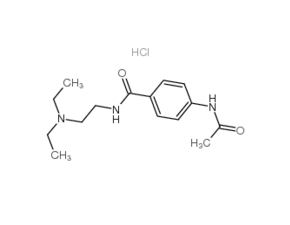
Acecainide hydrochloride
CAS No. 34118-92-8
Acecainide hydrochloride( —— )
Catalog No. M17487 CAS No. 34118-92-8
Acecainide hydrochloride is a major metabolite of procainamide. Its anti-arrhythmic action may cause cardiac toxicity in kidney failure.
Purity : >98% (HPLC)
 COA
COA
 Datasheet
Datasheet
 HNMR
HNMR
 HPLC
HPLC
 MSDS
MSDS
 Handing Instructions
Handing Instructions
| Size | Price / USD | Stock | Quantity |
| 2MG | 32 | In Stock |


|
| 5MG | 51 | In Stock |


|
| 10MG | 82 | In Stock |


|
| 25MG | 147 | In Stock |


|
| 50MG | 246 | In Stock |


|
| 100MG | 357 | In Stock |


|
| 200MG | Get Quote | In Stock |


|
| 500MG | Get Quote | In Stock |


|
| 1G | Get Quote | In Stock |


|
Biological Information
-
Product NameAcecainide hydrochloride
-
NoteResearch use only, not for human use.
-
Brief DescriptionAcecainide hydrochloride is a major metabolite of procainamide. Its anti-arrhythmic action may cause cardiac toxicity in kidney failure.
-
DescriptionAcecainide hydrochloride is a major metabolite of procainamide. Its anti-arrhythmic action may cause cardiac toxicity in kidney failure.
-
In Vitro——
-
In Vivo——
-
Synonyms——
-
PathwayOthers
-
TargetOther Targets
-
RecptorOthers
-
Research Area——
-
Indication——
Chemical Information
-
CAS Number34118-92-8
-
Formula Weight313.83
-
Molecular FormulaC15H24ClN3O2
-
Purity>98% (HPLC)
-
Solubility——
-
SMILESCC(=O)Nc1ccc(C(=O)NCCN(CC)CC)cc1.Cl
-
Chemical Name——
Shipping & Storage Information
-
Storage(-20℃)
-
ShippingWith Ice Pack
-
Stability≥ 2 years
Reference
1. Ikramuddin S,et al. JAMA. 2013 Jun 5;309(21):2240-9.
molnova catalog



related products
-
methyl 5-bromo-1H-py...
methyl 5-bromo-1H-pyrrole-2-carboxylate is a marine derived natural products found in Lissodendoryx sp.
-
NLS PKKKRKV
NLS (PKKKRKV) is a peptide derived from the 40 tumor antigen of the great ape virus (SV40 big T antigen), which is a method to enhance the nuclear portal in the research field of gene transfer.
-
VU625
VU625 (VU007625) is a selective and potent AeKir1 inhibitor (IC50: 96.8 nM) that acts as a mosquito killer and inhibits AeKir1-mediated currents.



 Cart
Cart
 sales@molnova.com
sales@molnova.com


